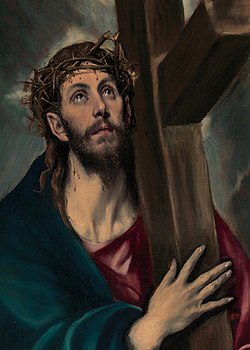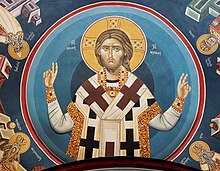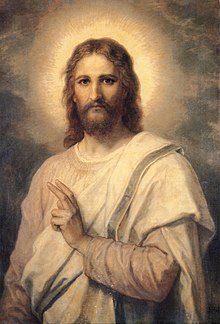Isa
Isah Almasihu, Mai ceto (hrsh-el|Ἰησοῦς|transl=Iesous); hrsh-he|ישו|Yēšū́aʿ); -larabci|عيسى|Annabi Isah) , an sansa da Isah na Nazareth da Isah Mai ceto, (Akwai sunaye da dama da ake wa Isah laƙabi da su a cikin littafi mai tsarki na sabon alƙawari. Ya kasance malami ne na Nasara kuma shugaban addini mai da'awa da ya kasance tun a karni na daya. Shi ne mafi darajar dan-Adam a addinin Kiristanci. Yawancin Kirista sun yi imanin cewa shi ne sura na ɗan Adam na Ubangiji da ya zo duniya kuma mai ceto da zai dawo a karshen duniya kamar yadda littafi mai tsarki na tsohon alƙawari ya tabbatar da Alqur'ani.






Yawancin Malamai sun yarda da cewar tarihin rayuwar Isah da tarihin sa, [1] [2] kamar yadda Richard A. Burridge yace: "Akwai wadanda suke fadin cewar Isah kawai wani kirkira ne da Coci siffanta shi, suna ganin ba wani Isah a zahirin rayuwa. Amma zance ban san wani malami da nake girmamawa ba dana sani, Wanda yake fadin haka a halin yanzu".[3] Robert M. Price bai yarda da cewar an taba yin Isah ba, amma kuma ya yarda da cewar ba Malamai dayawa ba ne suke ganin hakan.[4] James D. G. Dunn yana kiran da'awar cewar ba'a taba yin Isah a rayuwa ba, a matsayin "da'awa data mutu" aka bar yin ta a yanzu.[5] Michael Grant (a classicist) ya rubuta a 1977, "A shekarun nan, 'babu wani malami mai hankali da zai fara cewa babu tarihin samun Isah' ko at any rate very few, and they have not succeeded in disposing of the much stronger, indeed very abundant, evidence to the contrary".[6] Robert E. Van Voorst yafadi cewa Malaman baibul da kwararrun ýan tarihi suna ganin da'awar da muna cewa ba Isah a matsayin wata da'awa da aka ƙaryata ta. duk da cewar Nemansu akan Isah na Tarihi yayi sanadiyar samun karancin yarda akan Tarihan Dogaro Da Baibul da kuma yadda akayi kokarin zanen Isahn acikin baibul dayayi kama da Isah na Tarihi.[7] Ehrman ya rubuta: "The notion that the Gospel accounts are not completely accurate but still important for the religious truths they try to convey is widely shared in the scholarly world, even though it's not so widely known or believed outside of it."[8] efn|Sanders writes: "The earliest Christians did not write a narrative of Jesus' life, but rather made use of, and thus preserved, individual units—short passages about his words and deeds. These units were later moved and arranged by authors and editors. ... Some material has been revised and some created by early Christians."[9] Jesus was a Galilean Jew[10] who was baptized by John the Baptist and subsequently began his own ministry, preaching his message orally[11] and often being referred to as "rabbi".[12] Jesus debated with fellow Jews on how to best follow God, engaged in healings, taught in parables and gathered followers.[13][14] He was arrested and tried by the Jewish authorities,[15] turned over to the Roman government, and was subsequently crucified on the order of Pontius Pilate, the Roman prefect.[16] After his death, his followers believed he rose from the dead, and the community they formed eventually became the early Church.
Koyarwar kirista ta tabbatar da imani da yarda da haihuwar Isah sanadiyar ruhine da aka cusa a cikin Mahaifiyarsa ta hannun Holy Spirit, was born of a virgin named Mary, yana nuna miracles, yasamar da coci, yarasu sanadiyar gicciye shi da akayi, a matsayin sadaukar dashi dan cimma atonement, yatashi bayan yamutu, sannan ascended zuwa Heaven, daga nan ne will return. yawancin Christians believe Jesus enables people to be reconciled to God. The Nicene Creed asserts that Jesus will judge the living and the dead[17] either before or after their bodily resurrection,[18][19][20] an event tied to the Second Coming of Jesus in Christian eschatology.[21] The great majority of Christians worship Jesus as the incarnation of God the Son, the second of three persons of the Trinity. A minority of Christian denominations reject Trinitarianism, wholly or partly, as non-scriptural.
Jesus also figures in non-Christian religions and new religious movements. In Islam, Jesus (commonly transliterated as (transl|ar|ISO|[[Isa (name)|Isa])) is considered one of God's important prophets and the Messiah.[22][23][24] Muslims believe Jesus was a bringer of scripture and was born of a virgin, but was not the Son of God. The Quran states that Jesus himself never claimed divinity.[25] Most Muslims do not believe that he was crucified, but believe that he was physically raised into Heaven by God. In contrast, Judaism rejects the belief that Jesus was the awaited Messiah, arguing that he did not fulfill Messianic prophecies, and was neither divine nor resurrected.[26]
wanda kiristoci masu amfani da harshen Hausa suke kira Yesu Kristi Annabi ne daga cikin annabawan Allah. Uwarsa Maryama ta haife shi ba tare da tayi aure ba. Shi Almasihu ruhin Allah ne. Amma a wani gefen kiristoci masu amfani da harshen Hausa sun dauki Almasihu a matsayin dan Allah. Ga al'ummar Hausawa Musulmi, Yesu shine Annabi Isa (Alaihissalam). Sai dai su Musulmi ba su yarda a suranïta annabawa ba don haka Kiristoci masu amfani da Harshen Hausa ne kawai suke gane wannan suna Annabi isah shine wanda Allah.Yabashi littafin (Ingila)Wanda kiristoci suke kiranta da(Bible).A addinin musulunci an bada tarihi a karshen zamani annabi isah zai dawo duniya domin yakashe .[Dajjal].
Manazarta
gyara sashe- ↑ efn |name=exist|In a 2011 review of the state of modern scholarship, Bart Ehrman wrote, "He certainly existed, as virtually every competent scholar of antiquity, Christian or non-Christian, agrees".
- ↑ cite book|first=Bart|last=Ehrman|year=2011|title=Forged: writing in the name of God – Why the Bible's Authors Are Not Who We Think They Are|isbn=978-0-06-207863-6 |url=https://books.google.com/?id=MtOMO8i4GLoC |publisher=HarperCollins |page=285
- ↑ cite book|title=Jesus Now and Then|first1= Richard A.|last1= Burridge |first2= Graham |last2= Gould|year=2004| isbn= 978-0-8028-0977-3 |page=34 |publisher=Wm. B. Eerdmans Publishing
- ↑ cite encyclopedia|first=Robert M. |last=Price |title=Jesus at the Vanishing Point|encyclopedia= The Historical Jesus: Five Views|editor-last1= Beilby|editor-last2= Eddy|year= 2009 |publisher= InterVarsity| isbn= 978-0-8308-7853-6 | editor-first= James K.|pages=55, 61 |url=https://books.google.com/books?id=O33P7xrFnLQC&pg=PA55 |editor2-first= Paul R.
- ↑ cite encyclopedia|title=Paul's understanding of the death of Jesus|encyclopedia=Sacrifice and Redemption|first= Stephen W.|last= Sykes |year=2007| publisher= Cambridge University Press| isbn= 978-0-521-04460-8|pages=35–36
- ↑ cite book|first=Michael|last=Grant|title=Jesus: An Historian's Review of the Gospels|publisher=Scribner's|year=1977|isbn=978-0-684-14889-2|page=200
- ↑ sfn|Powell|1998|pp=168–73
- ↑ Bart D. Ehrman, MDiv, PhD. Historical Jesus. 'Prophet of the New Millennium.' Course handbook, p. 10 (Lecture Three. V. B.) The Teaching Company, 2000, Lecture 24
- ↑ sfn|Sanders|1993|p=57
- ↑ Cite error: Invalid
<ref>tag; no text was provided for refs namedVermes 1981 - ↑ cite book|first = James D. G. |last = Dunn |title= The Oral Gospel Tradition |publisher= Wm. B. Eerdmans Publishing |year = 2013 | pages= 290–91
- ↑ cite web |title =International Standard Bible Encyclopedia Online |editor=James Orr|year=1939|publisher=Wm. B. Eerdmans Publishing Co.|url=http://www.internationalstandardbible.com/R/rabbi.html
- ↑ sfn|Levine|2006|p=4
- ↑ cite book|last1=Charlesworth|first1=James H.|title=The Historical Jesus: An Essential Guide|date=2008|page=113|url=https://books.google.com/?id=YTIGy5t45WgC&pg=PT113&dq=jesus+healing+historical#v=onepage%7Cisbn=9781426724756
- ↑ sfn|Sanders|1993|p=11
- ↑ sfn|Levine|2006|p=4
- ↑ Cite encyclopedia |last=Wilhelm |first=Joseph |title=The Nicene Creed |encyclopedia=The Catholic Encyclopedia |volume=11 |publisher=Robert Appleton Company |date=1911 |url=http://www.newadvent.org/cathen/11049a.htm
- ↑ Cite error: Invalid
<ref>tag; no text was provided for refs namedOxford Companion - ↑ cite web | first = James | last = Tabor | publisher = UNCC | url = https://clas-pages.uncc.edu/james-tabor/ancient-judaism/death-afterlife-future/ | title = What the Bible Says About Death, Afterlife, and the Future| date = 2013-03-2
- ↑ cite book| last = Hoekema|first= Anthony A. |year=1994 |title= The Bible and the Future | publisher= Eerdmans Publishing | pages = 88–89 |url=https://books.google.com/?id=c2yT_7xw35sC&printsec=frontcover#v=onepage%7Cisbn= 978085364624
- ↑ cite book|title = Systematic Theology, Volume 2, Second Edition: Biblical, Historical, and Evangelical | first= James L. |last= Garrett |publisher= Wipf and Stock Publishers |year= 2014 | url = https://books.google.com/books?id=WZEhBQAAQBAJ&lpg=PA766&dq=resurrection%20before%20after%20second%20coming&pg=PA766#v=onepage |page= 766| isbn= 9781625648525
- ↑ cite web|url=http://www.usc.edu/org/cmje/religious-texts/quran/verses/004-qmt.php#004.157 |title=Quran 3:46–158 |archiveurl=https://web.archive.org/web/20150501064500/http://www.usc.edu/org/cmje/religious-texts/quran/verses/004-qmt.php |archivedate=May 1, 2015 |deadurl=yes |df=
- ↑ Cite error: Invalid
<ref>tag; no text was provided for refs namedCEI - ↑ cite book |last=Siddiqui |first=Mona |title=Christians, Muslims, and Jesus |publisher=Yale University Press |year=2013 |authorlink = Mona Siddiqui |url=https://books.google.com/?id=L-fRe-18OcIC&printsec=frontcover&dq=Christians,+Muslims,+and+Jesus#v=onepage&q=Christians%2C%20Muslims%2C%20and%20Jesus%7Cisbn=978-0300169706
- ↑ Cite error: Invalid
<ref>tag; no text was provided for refs namedMorgan - ↑ cite web|url = http://www.jewishencyclopedia.com/articles/8616-jesus-of-nazareth%7Ctitle = Jesus of Nazareth|date = |access-date = |website = Jewish Encyclopedia|publisher = |last = Jacobs|first = Joseph|last2 = Kohler|first2 = Kaufmann|last3 = Gottheil|first3 = Richard|last4 = Krauss|first4 = Samuel
. .
